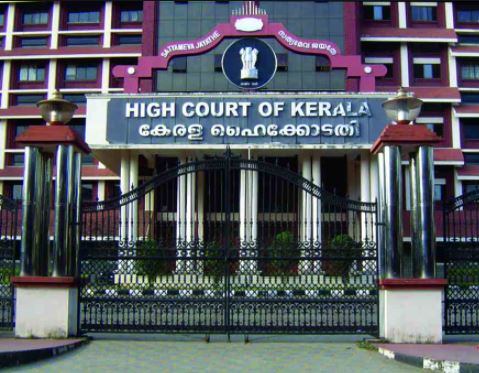The Kerala High Court dismissed a Public Interest Litigation (PIL) filed seeking direction to the respondents to provide nomenclature in the English language for the Acts (The Bharatiya Nagarik Suraksha Sanhita, 2023, The Bharatiya Nyaya Sanhita, 2023 and The Bharathiya Sakshya Adhiniyam, 2023).
The Petitioner further prayed to:-
-Declare that the action of respondents in giving nomenclature in Hindi and Sanskrit languages for the Acts is ultra virus to Article 348 and the scheme of the Constitution.
-Declare that the parliament has no authority to provide nomenclature/title to a particular Act in any language other than the English language, in the light of Article 348 of the Constitution.
The Division Bench of Acting Chief Justice A. Muhamed Mustaque and Justice S. Manu noted that tese enactments came into effect from 01.07.2024. Title of these legislations though are described in English but the words are not from the English language. The question before the Court is whether these legislations are in violation of Article 348(1)(ii) of the Constitution of India. Article 348 of the Constitution of India mandates the following;
“348. Language to be used in the Supreme Court and in the High Courts and for Acts, Bills, etc.-(1) Notwithstanding anything in the foregoing provisions of this Part, until Parliament by law otherwise provides-
(a) all proceedings in the Supreme Court and in every High Court,
(b) the authoritative texts-
(i) of all Bills to be introduced or amendments thereto to be moved in either House of Parliament or in the House or either House of the Legislature of a State,
(ii) of all Acts passed by Parliament or the Legislature of a State and of all Ordinances promulgated by the President or the Governor of a State, and
(iii) of all orders, rules, regulations and bye-laws issued under this Constitution or under any law made by Parliament or the Legislature of a State, shall be in the English language.
(2) Notwithstanding anything in sub-clause (a) of clause (1), the Governor of a State may, with the previous consent of the President, authorise the use of the Hindi language, or any other language used for any official purposes of the State, in proceedings in the High Court having its principal seat in that State:
Provided that nothing in this clause shall apply to any judgment, decree or order passed or made by such High Court.
(3) Notwithstanding anything in sub-clause (b) of clause (1), where the Legislature of a State has prescribed any language other than the English language for use in Bills introduced in, or Acts passed by, the Legislature of the State or in Ordinances promulgated by the Governor of the State or in any order, rule, regulation or bye-law referred to in paragraph (iii) of that sub-clause, a translation of the same in the English language published under the authority of the Governor of the State in the Official Gazette of that State shall be deemed to be the authoritative text thereof in the English language under this article.”
What is the meaning of ‘authoritative text’ as referred to in Article 348 1(b) of the Constitution of India? The text of this enactment is in English. Here, the text means content. Authoritative is used as an adjective to indicate that the quality of the text or content must be in English. Although the title of a legislation is often used to understand the text and is treated as integral to the text, it cannot be construed as an authoritative text as understood in Article 348 of the Constitution of India. Nomenclature is nothing but title of the legislation and cannot be considered as the text referred to in Article 348 of the Constitution of India, the Court observed.
Article 348 is based on Section 214(5) and Section 227 of the Government of India Act, 1935. This Article is intended to achieve uniformity in the interpretation of statutory provisions and the text of legislation. The Constitution makers were aware native speakers may find difficulty in interpreting text of a Parliament enactment, if it is not in English language.
The petitioner contended that, if Parliament enacts any law that violates fundamental rights, that law should be declared void.
The Court was unable to accept this argument since there is no fundamental right for a citizen to have the title of laws in a language that is familiar to him. Fundamental rights are group rights and the Constitution can only view citizens as a homogeneous group. English is a language recognized under the Constitution. Under Article 351 of the Constitution, directives are issued for the development of Hindi language as a medium of expression for all the elements of composite culture of India. “Therefore, nothing prevents Parliament from using Hindi words as the title of an enactment. The mandate under the Constitution is to prefer English as the authoritative text to ensure uniformity throughout the country, not to denounce Hindi in any form with reference to the title of an enactment.”
The title of an enactment cannot be understood as an authoritative text under Article 348. The Court noted that the petitioner has no justiciable right to approach the court, as no fundamental rights have been violated and therefore this public interest litigation does not involve any public interest.


